Overview
- Brief Narrative
- Miniature, handmade sketchbook of ink and watercolor sketches created by several prisoners in Vapniarka concentration camp and gifted to Dr. Arthur Kessler in 1943. The images depict scenes of daily prisoner life in the concentration camp. Dr. Kessler was a fellow inmate, and was given “The Little Book” by the prisoners, many of whom he treated while managing a 30-person medical department at the camp. In late 1942, he treated fellow prisoners who had gone on a hunger strike because of their reactions, including paralysis, to eating a toxic fodder pea, Lathyrus sativus. Following the war, Dr. Kessler gave lectures and published articles about these reactions, and was considered a leader in the field of Lathyrism. He also continued to treat the victims of Vapniarka who survived and immigrated to Israel without compensation.
- Date
-
creation:
1943
- Geography
-
depiction:
Vapni︠a︡rka (Vinnyt︠s︡ʹka oblastʹ, Ukraine)
- Credit Line
- United States Holocaust Memorial Museum Collection, Gift of David Kessler
- Markings
- front cover, shaped metal wire, cursive : (illegible text) [Honorary doctorate from the University of Vapniarka]
- Contributor
-
Subject:
Arthur Kessler
Owner: Arthur Kessler
- Biography
-
Arthur Kessler (1903-2000) was born on October 11, 1903 in Gewitsch, Moravia (Jevíčko, Czech Republic) to David (1866-1945) and Anna (née Gottfried, 1875-1947) Kessler. He had three brothers: Joseph (b. 1902), Julius, and Leo. The family moved to Czernowitz (Chernivtsi, Ukraine) in 1913 where David worked as a theology professor and rabbi. During World War I the family moved back to Gewitsch, but returned after the war to what was now part of Romania. Arthur studied medicine and graduated from the University of Vienna in 1929. He served as a doctor in the Romanian army from 1930-1933. He married Chaia Schulsinger (b. 1911) on May 6, 1937 in Czernowitz. Their first child, Vera, was born in 1940.
After the Russians occupied Czernowitz in June 1940, Arthur became the manager of the hospital. After the Germans reestablished Romanian rule in the city in July 1941, Arthur was arrested as a Communist/Soviet agent and imprisoned from December 30, 1941 to February 7, 1942. He was released after paying a bribe. In September of that year, Arthur was rounded up and deported to the Vapniarka concentration camp in Transnistria, where he was both a prisoner and head doctor of a 30-person medical department. In late 1942, he treated the prisoners who had gone on a hunger strike because of reactions that they had to eating a toxic fodder pea (lathyrism). Arthur and other prisoners were transferred out of Vapniarka and sent to the ghetto in Olgopol on May 1, 1943.
A year later he escaped, returned to Romania, and reunited with his wife Chaia and their daughter, Vera. Chaia and Vera were blond and passed as Aryans. They had survived by going to Bucharest and moving from one place to another. The Kessler family went to Palestine in 1944 where Arthur published several articles on lathyrism and became the director of the Allergy Department of the Zamenhof Clinic in Tel Aviv. His son David was born in 1948. Arthur continued to give lectures and publish articles, and was considered a leader in the field of lathyrism. He also continued to treat the victims of Vapniarka who survived and immigrated to Israel without compensation.
Arthur’s parents survived the war in Czernowitz. All three of his brothers survived the Holocaust. Joseph immigrated to Peru after the war, Julius immigrated to the United States after the war, and Leo died in Bucharest.
Physical Details
- Language
- Romanian
- Classification
-
Art
- Category
-
Visual works (works) (aat)
- Object Type
-
Drawing (lcsh)
- Genre/Form
- Sketches.
- Physical Description
- Handmade, miniature book with a leather cover containing 42 individual drawings in graphite, ink, and watercolor on tan paper. The images depict scenes of daily prisoner life in a concentration camp. There is a title page dedicated to Dr. Kessler in purple ink, along with several pages of text in a combination of graphite and several colors of ink. The book consists of several paper folios sewn together to create a block containing 43 pages with rounded corners. The block is secured within the thin, paperboard cover by pastedowns at the front and back. The cover is covered with brown leather, and was originally overlaid with a clear, plastic film, possibly cellulose nitrate, set into a border around the edges. Shaped, metal wire text, possibly copper-alloy, is adhered to the front cover. A narrow, U-shaped metal pin is attached to the spine by a twisted, two-tone length of brown thread. The surface of the leather is cracked and worn with small losses, and there is corrosion along the wire text. The film is now mostly missing, with several remnants in the lower right corner.
- Dimensions
- overall: Height: 1.130 inches (2.87 cm) | Depth: 0.500 inches (1.27 cm)
- Materials
- overall : leather, paper, metal, thread, ink, watercolor, graphite pencil, plastic, adhesive
Rights & Restrictions
- Conditions on Access
- No restrictions on access
- Conditions on Use
- No restrictions on use
Keywords & Subjects
- Topical Term
- Medical care. Jewish physicians--Ukraine--History. Concentration camp inmates--Ukraine. Lathyrism.
- Geographic Name
- Chernivtsi (Ukraine) Palestine. Transnistria (Ukraine : Territory under German and Romanian occupation, 1941-1944)
- Personal Name
- Kessler, Arthur, 1903-2000.
- Corporate Name
- Vapniarka (Concentration camp)
Administrative Notes
- Legal Status
- Permanent Collection
- Provenance
- The sketch book was donated to the United States Holocaust Memorial Museum in 2019 by David Kessler, the son of Dr. Arthur Kessler.
- Record last modified:
- 2024-10-02 14:48:33
- This page:
- https://collections.ushmm.org/search/catalog/irn706958
Download & Licensing
In-Person Research
- By Appointment
- Request 21 Days in Advance of Visit
- Plan a Research Visit
- Request to See This Object
Contact Us
Also in Dr. Arthur Kessler collection
The collection documents the Holocaust experiences of Dr. Arthur Kessler, originally of Czernowitz (Chernivtsi, Ukraine), including his imprisonment in the Vapniarka concentration camp in Transnistria and his efforts to treat and manage an outbreak of paralysis of fellow prisoners due to consumption of Lathyrus sativus. Included are artifacts, objects gifted to him, biographical materials, correspondence, research notes and samples related to Lathyrism, written testimony, writings, and a small amount of photographs. Also included is his unpublished memoir Ein Arzt im Lager (A Camp Physician).
Date: 1890-1982
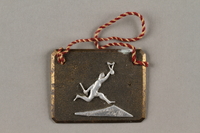
Metal plaque made by Vapniarka prisoners
Object
Handmade metal plaque with yarn loop for hanging, given as gift to Dr. Arthur Kessler, who was interned and worked at Vapniarka concentration camp in Transnistria. The plaque was made and given to him by prisoners at Vapniarka.
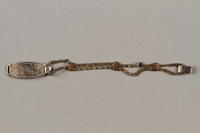
Bracelet made by Vapniarka prisoners
Object
Metal bracelet given as gift to Dr. Arthur Kessler, who was interned and worked at Vapniarka concentration camp in Transnistria. The bracelet was made and given to him by prisoners at Vapniarka.
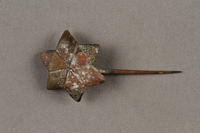
Pin made by Vapniarka prisoners
Object
Pin given as gift to Dr. Arthur Kessler, who was interned and worked at Vapniarka concentration camp in Transnistria. The pin was made and given to him by prisoners at Vapniarka.
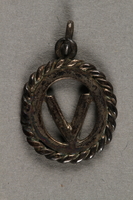
"V" pendant or charm, made by Vapniarka prisoners
Object
Pendant or charm with the letter "V" given as gift to Dr. Arthur Kessler, who was interned and worked at Vapniarka concentration camp in Transnistria. The pendant was made and given to him by prisoners at Vapniarka.
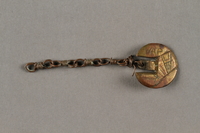
Chain with pendant or charm, made by Vapniarka prisoners
Object
Chain with pendant or charm given as gift to Dr. Arthur Kessler, who was interned and worked at Vapniarka concentration camp in Transnistria. The pendant was made and given to him by prisoners at Vapniarka.
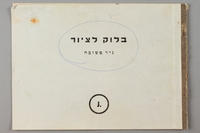
Portfolio cover for series of drawings and sketches
Object
Portfolio of drawings by Leibel and Ilie, along with the original sketches by Dr. Arthur Kessler. Dr. Kessler commissioned the drawings based on his sketches.
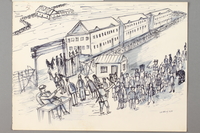
Drawing with original sketch
Object
One of a portfolio of drawings by Leibel and Ilie, along with the original sketches by Dr. Arthur Kessler. Dr. Kessler commissioned the drawings based on his sketches.
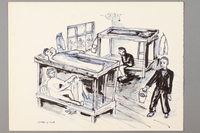
Drawing with original sketch
Object
One of a portfolio of drawings by Leibel and Ilie, along with the original sketches by Dr. Arthur Kessler. Dr. Kessler commissioned the drawings based on his sketches.

Drawing with original sketch
Object
One of a portfolio of drawings by Leibel and Ilie, along with the original sketches by Dr. Arthur Kessler. Dr. Kessler commissioned the drawings based on his sketches.
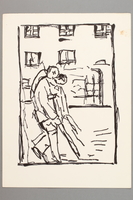
Drawing with original sketch
Object
One of a portfolio of drawings by Leibel and Ilie, along with the original sketches by Dr. Arthur Kessler. Dr. Kessler commissioned the drawings based on his sketches.
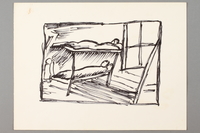
Drawing with original sketch
Object
One of a portfolio of drawings by Leibel and Ilie, along with the original sketches by Dr. Arthur Kessler. Dr. Kessler commissioned the drawings based on his sketches.
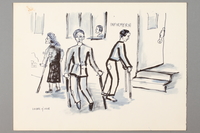
Drawing with original sketch
Object
One of a portfolio of drawings by Leibel and Ilie, along with the original sketches by Dr. Arthur Kessler. Dr. Kessler commissioned the drawings based on his sketches.

Drawing with original sketch
Object
One of a portfolio of drawings by Leibel and Ilie, along with the original sketches by Dr. Arthur Kessler. Dr. Kessler commissioned the drawings based on his sketches.
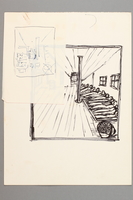
Drawing with original sketch
Object
One of a portfolio of drawings by Leibel and Ilie, along with the original sketches by Dr. Arthur Kessler. Dr. Kessler commissioned the drawings based on his sketches.
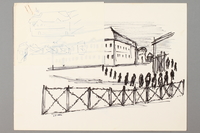
Drawing with original sketch
Object
One of a portfolio of drawings by Leibel and Ilie, along with the original sketches by Dr. Arthur Kessler. Dr. Kessler commissioned the drawings based on his sketches.
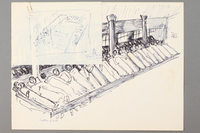
Drawing with original sketch
Object
One of a portfolio of drawings by Leibel and Ilie, along with the original sketches by Dr. Arthur Kessler. Dr. Kessler commissioned the drawings based on his sketches.
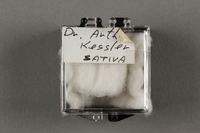
Sativa or fodder pea seed
Object
Fodder pea (sativa) seed collected by Dr. Arthur Kessler at Vapniarka camp in Transnistria, where he worked and was interned.
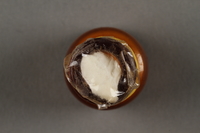
Seed housed inside glass jar
Object
Seed, possibly fodder pea (sativa), collected by Dr. Arthur Kessler at Vapniarka camp in Transnistria, where he worked and was interned.
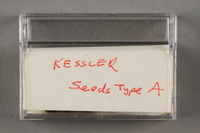
Seeds "Type A"
Object
Seeds collected by Dr. Arthur Kessler at Vapniarka camp in Transnistria, where he worked and was interned.
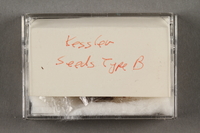
Seeds "Type B"
Object
Seeds collected by Dr. Arthur Kessler at Vapniarka camp in Transnistria, where he worked and was interned.
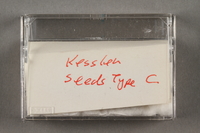
Seeds "Type C"
Object
Seeds collected by Dr. Arthur Kessler at Vapniarka camp in Transnistria, where he worked and was interned.
Charms made by Vapniarka prisoners
Object
Handmade charms given as gift to Dr. Arthur Kessler, who was interned and worked at Vapniarka concentration camp in Transnistria. The charms (a handmade metal bucket and crutch on a fabric chain, plus an additional crutch), were made and given to him by prisoners at Vapniarka.
Dr. Arthur Kessler papers
Document
The collection documents the Holocaust experiences of Dr. Arthur Kessler, originally of Czernowitz (Chernivtsi, Ukraine), including his imprisonment in the Vapniarka concentration camp in Transnistria and his efforts to treat and manage an outbreak of paralysis of fellow prisoners due to consumption of Lathyrus sativus. Included are biographical materials, correspondence, research notes on Lathyrism, written testimony, writings, and a small amount of photographs. Also included is his unpublished memoir Ein Arzt im Lager (A Camp Physician). Biographical materials include birth certificates, a marriage certificate, identification cards, Romanian passports, restitution claims paperwork for Arthur and his wife Chaia, and papers related to Arthur’s medical career. Also included is a document regarding Arthur’s release from jail in Czernowitz in 1942 and an exemption certificate from deportation from Czernowitz in 1942. Correspondence primarily consists of wartime letters written to his cousin Jacob Granirer in Bucharest, possibly regarding his work with Lathyrism in Vapniarka. There is also a 1946 letter to Arthur from the Bezalel National Museum regarding the exhibition of gifts given to him by fellow prisoners of Vapniarka. Vapniarka related documents include a list of survivors of the camp living in Israel, notebooks and loose notes regarding Arthur’s work with Lathyrism while in Vapniarka, typed testimony in German about his experiences there that was likely submitted to Yad Vashem, and restitution claims paperwork for survivors of Vapniarka. Writings consist of articles written by Arthur regarding Lathyrism as well as his unpublished memoir. The articles include a 1963 article in German and an English translation entitled “Vascular diseases by consumption of Lathyrus Sativa” that was never published. Arthur’s unpublished memoir, Ein Arzt im Lager (A Camp Physician) was likely written in the 1960s. In it, he describes his arrest and deportation to Vapniarka, his involvement and observations about the disease afflicting the prisoners, the experiences of Arthur and other prisoners transferred from Vapniarka to the Olgopol ghetto (Olhopil, Ukraine), his return to Romania, reunification with his family, and flight from Romania. The manuscript is typed in German with some handwritten edits. It is split into three chapters: I. Im Lager, II. Im Ghetto, and III. Der Weg Zurück. Chapter II contains some hand illustrations and there are two hand drawn maps after Chapter III. Photographs consist of pre-war, wartime, and postwar depictions of Arthur and his family. Included is a photograph of Arthur’s parents, Anna and David Kessler; depictions Arthur as a doctor in the Romanian army and in Zwickau, Germany, a 1943 photograph of Arthur in Olgopol with Dr. Moritz, Polia, Dubs, and three other unknown individuals, and an undated photograph with Arthur, Polia Dubs, “Engineer Berkovitz,” Dr. Moritz, and “Engineer Davidovitz.” There are also four post-war photographs of an exhibit on Vapniarka at the Ghetto Fighters’ House in Israel.




